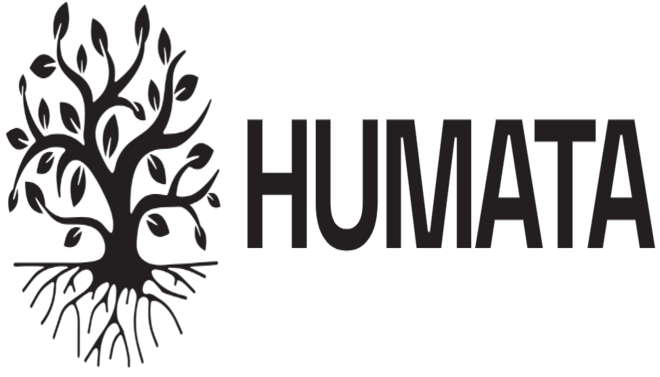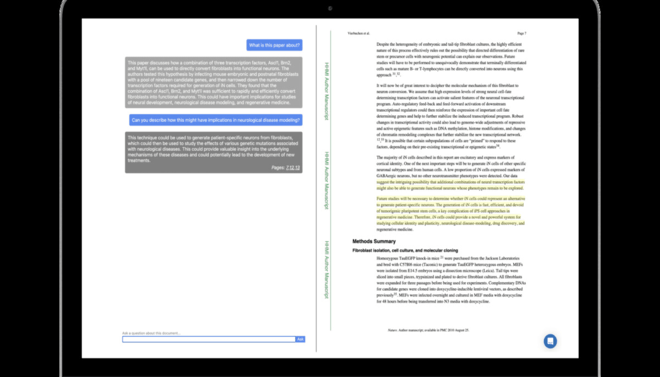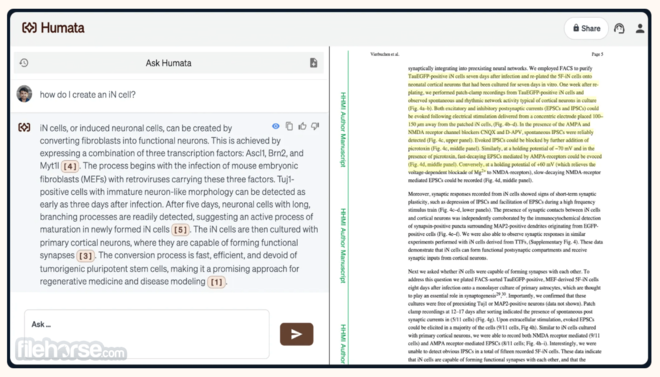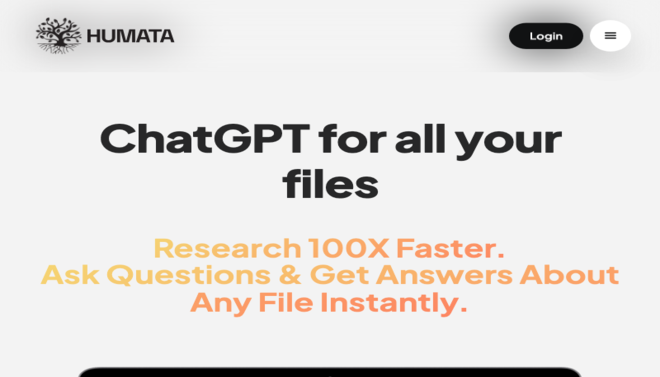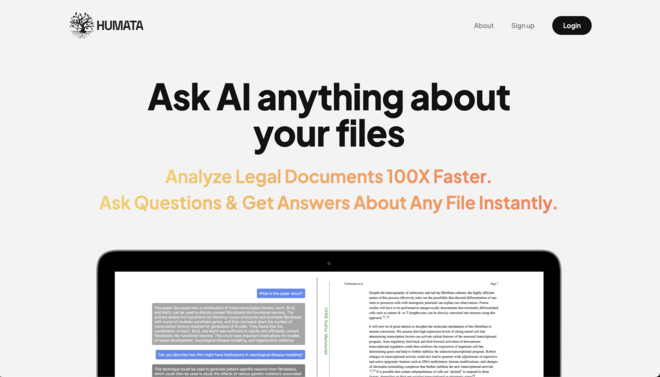Humata AI is a specialized AI-powered document assistant designed to analyze, summarize, and extract information from complex files like PDFs, research papers, and legal documents.
Introduction
Humata AI is a specialized AI-powered document assistant designed to analyze, summarize, and extract information from complex files like PDFs, research papers, and legal documents.
It is often described as the “ChatGPT of documents” because its core function is to allow users to converse with their files via a natural language chat interface. Humata achieves this by using Retrieval-Augmented Generation (RAG) to ensure every AI-generated answer is cited directly with page references from the uploaded documents.
This process dramatically accelerates research, literature reviews, and data extraction, making lengthy, complex materials instantly digestible and verifiable for students, researchers, and professionals.
Document Q&A
Citation-Based
Multi-File Analysis
OCR Enabled
Enterprise Security
Review
Humata AI has verifiable Q&A and deep document understanding. Its primary strength is the citation feature, which provides clickable page references for every AI-generated answer, building immense trust and eliminating AI hallucinations. The tool excels at handling multi-file analysis and synthesizing insights across entire folders of documents, which is invaluable for literature reviews.
While the pricing is based on a rigid page-limit structure and high-tier features like OCR and multi-user access are expensive, the platform’s focus on security (SOC 2 compliant) and efficiency makes it an indispensable research assistant for professionals dealing with large volumes of complex, private data.
Features
Instant Q&A with Citations
The core feature that generates highly accurate, concise answers to questions and automatically provides direct, verifiable page references from the source file.
Multi-Document Analysis
Allows users to upload and query entire folders of related documents simultaneously, synthesizing a unified answer based on all sources.
Automated Summarization & Extraction
Generates quick, structured summaries (e.g., 5 key bullet points) of entire papers and can extract specific data (names, dates, financial figures) into tables.
Optical Character Recognition (OCR) (Team+)
Enables the AI to analyze and extract text from scanned PDFs and image-based documents that would otherwise be unreadable by standard text tools.
Secure Cloud Storage
Guarantees enterprise-grade security with AES-256 encryption at rest and adherence to strict data privacy standards (SOC 2 Type II compliance).
Resolution Outputs
Midjourney delivers high-resolution, print-ready image outputs perfectly suited for designers and marketers.
Best Suited for
Academic Researchers
Ideal for quickly synthesizing literature reviews and comparing methodologies across multiple papers.
Students (.edu)
Perfect for quickly understanding lengthy textbooks or complex articles and preparing for exams (with the discounted plan).
Game Designers
Generate concept art or AI dungeons for games or creative worldbuilding.
Legal Professionals
Excellent for rapidly querying large legal documents, contracts, and case precedents to extract specific clauses.
Technical Writers
A strong tool for analyzing technical specifications and internal reports to quickly generate summaries and executive briefs.
Consultants & Analysts
Useful for extracting specific financial figures or data points from client reports and market research.
Strengths
Citation feature eliminates AI hallucination by grounding every answer with verifiable, clickable page references.
Multi-file Q&A significantly accelerates literature reviews and data synthesis across entire project folders.
Enterprise-grade compliance (SOC 2, HIPAA focus) ensures maximum security for handling private and sensitive files.
Extremely fast document processing and a simple, intuitive chat interface make complex analysis accessible to non-experts.
Weakness
The tool lacks grammar/plagiarism checks and deep editing features, requiring external tools for writing refinement.
The platform may occasionally struggle with very large, book-sized PDFs.
Getting started with: step by step guide
The Humata AI workflow is direct and intuitive, revolving around file upload and conversational prompting.
Step 1: Upload Documents
The user navigates to their dashboard and uploads a single PDF, Word document, or an entire folder of files (e.g., research papers or reports).
Step 2: Indexing
Humata’s AI quickly processes and indexes the content of the files, building a vectorized representation of the document’s knowledge.
Step 3: Ask a Question
The user types a natural language question into the chat interface (e.g., “What were the key findings of the experiment on page 12?”).
Step 4: Receive Cited Answer
Humata returns a concise summary of the answer, immediately followed by clickable citations that link directly to the source page in the document viewer.
Step 5: Extract Data (Command)
The user issues an extraction command: “Extract all dates, names, and monetary values into a table.”
Step 5: Organize
The user organizes the uploaded documents into folders and can switch between files to ask contextual questions about their specific contents.
Frequently Asked Questions
Q: Is there a free version of Humata AI?
A: Yes, Humata offers a Free plan that allows users to process up to 60 pages of documents monthly and access the basic Q&A features.
Q: What document formats does Humata support?
A: Humata primarily focuses on PDFs, but also supports other text-based formats like Word documents, PowerPoint presentations, and can use OCR on scanned images (on paid plans).
Q: How is Humata different from ChatGPT?
A: Humata is grounded in your uploaded files; it generates answers based only on the data in your documents and provides citations. ChatGPT has general knowledge but cannot reliably cite sources from private files.
Q: Can I analyze multiple documents at the same time?
A: Yes, a key feature is Multi-File Q&A, which allows you to upload an entire folder and ask a question that synthesizes information across all documents simultaneously.
Q: Is my uploaded data used to train the AI models?
A: No. Humata maintains a strict privacy policy and does not use customer data to train its public AI models.
Q: What is the benefit of the Citation Highlighting feature?
A: It builds trust and verifiability. When the AI answers a question, you can click the citation to be taken directly to the exact sentence or page in the original PDF that the AI used as its source.
Q: What are "pages" in the pricing model?
A: “Pages” are the limit on the total number of document pages you can upload and process each month across all your files.
Q: Is the Student plan available to all students?
A: The Student plan offers a reduced price but typically requires a verified academic email address (ending in .edu or similar) for access.
Q: Does Humata support Single Sign-On (SSO)?
A: Yes, the Enterprise plan and higher tiers offer SAML-based SSO integration for secure, centralized user management within large organizations.
Q: What is the main drawback of the Free plan?
A: The main drawback is the low 60-page limit and the lack of advanced features like OCR, which makes it unsuitable for heavy research users or processing scanned documents.
Pricing
Humata AI operates on a freemium, page-limit subscription model. The Free plan offers limited monthly page processing and basic functionality. Paid tiers (Student, Expert, Team) increase the number of pages that can be processed and unlock features like OCR, advanced permissions, and multi-user access. All plans include pay-as-you-go options for additional pages once the monthly limit is reached.
Basic
$1.99/month
Academic Rate (requires .edu email), Additional pages ($0.02/page).
Standard
$10/month
3 Users, Folder Level Permissions, Premium Chat Support.
Pro
$46/month
OCR (Scanned Text), Departmental Permissions, SOC-2 Compliance, Customization.
Alternatives
ChatPDF / PDFgear
Simple, free/low-cost web-based tools that allow basic conversational Q&A with PDFs but generally lack multi-file analysis or guaranteed citation features.
Elicit AI
A sophisticated research tool that specializes in automating systematic reviews and finding relevant studies across academic literature.
Grammarly/QuillBot
Tools focused on writing assistance (grammar, paraphrasing) rather than deep, file-based research and document Q&A.
Share it on social media:
Questions and answers of the customers
There are no questions yet. Be the first to ask a question about this product.

Humata AI
Sale Has Ended

